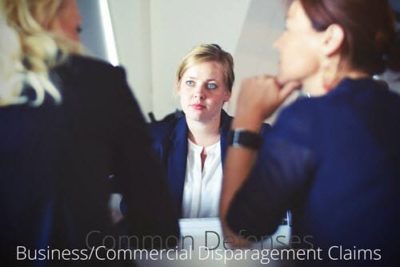
What Is Tortious Interference?
This page has been peer-reviewed, fact-checked, and edited by qualified attorneys to ensure substantive accuracy and coverage.
Tortious interference – also commonly referred to as ‘tortious interference with contract’ – is a rather daunting legal term that sounds more complicated than it actually is. To start, let’s break down the word term tortious interference into two core components:
- Tortious: refers to a tortious act, a harm brought about through tort which infringes on another person’s rights.
- Interference: refers to the interference with another person’s business relationships and contractual relations, which ultimately causes economic harm and damage.
If you’re still asking yourself, “what does tortious interference mean,” look no further, below is a simple and concise tortious interference definition and example by author of the Dictionary of Modern Legal Usage Bryan A. Garner.
Garner, speaking to legendary New York Times wordsmith William Safire defined tortious interference as the following, “Say you had a contract with Joe Blow, and I for some reason tried to get you to break that contract…Or say that Pepsi has an exclusive contract with a hotel chain to carry Pepsi products, and Coke tries to get the hotel to carry Coke despite that contract. That’s tortious interference.”
As you can imagine from the above example, the possibilities for tortious interference are ripe, and likely occurring at unprecedented levels – involving actors as diverse as small-town mom and pop stores all the way to multinational corporations and Playboy models.
For example, in 1985, a Texas jury ruled that Texaco – the American oil subsidiary of Chevron – was required to pay Pennzoil over $10.53 billion for interfering with Pennzoil’s previously announced takeover of Getty Oil. At the time, it was the largest jury award ever granted in a civil suit – ultimately forcing Texaco to file for bankruptcy.
Furthermore, tortious interference doesn’t always require an intentional interference with another’s business relationships and contractual relations, and may arise in cases where a party’s negligence or reckless behavior results in economic harm or damage to contractual relationships.
For reference, tortious interference may also be referred to as:
- Wrongful interference with a business relationship,
- Wrongful interference with business relations,
- Tortious interference with prospective economic advantage,
- Malicious interference, & as mentioned above
- Tortious interference with contract.
Defamation Removal Fact: Due to being epicenters for business and enterprise, Texas, California, Florida and New York are three of the most common jurisdictions where tortious interference cases are litigated in the United States.
If you or your business has been the victim of tortious interference or suffered from other interference with your business relationships, reach out to the internet defamation lawyers of Minc Law today! At Minc Law, we boast a nearly 100% online defamation removal rate, and all for a flat, reasonable fee.
★★★★★
Minc handled my reputation issue quickly and professionally. Would recommend their services to anyone.JP,Feb 27, 2020
The Minc Law team of nationally recognized defamation lawyers have litigated in order 19 states and 3 countries, and have secured hundreds of defamation takedowns and removals. Furthermore, they are experienced with the ins and outs of state tortious interference laws, and will assist you in formulating the most direct and effective legal gameplan.
Reach out today by calling us at (216) 373-7706, or by scheduling a meeting online by filling out our online contact form.
At Minc Law, we’re here to fight for you and your business’s reputation.
Let us help. Contact us for a free consultation with an intake specialist to help you explore your removal options and craft an effective strategy.Are you the target of defamation?
Tortious Interference Claims Against Hostile Online Reviews
Be that as it may, reputation-conscious businesses and professionals are now utilizing tortious interference claims – in tandem with the more common complaints of defamation of character and false light – to fight back if they receive a negative and hostile online review.
You might be wondering, “What does tortious interference have to do with the internet and defamation?”
Potentially, quite a lot.
Tortious interference claims have been popping up in alarming numbers over the years, especially in the case of online defamation suits and cases involving negative comments on product and service review sites. Granted, tortious interference isn’t always so easy to prove – and some legal analysts actually look down on tortious interference claims, viewing them as a “kitchen sink” accusation, used by plaintiff’s and lawyers who are trying to throw every charge they can think of at a defendant(s).
“There ought to just be a rule that if you’re even threatening to sue someone for ‘tortious interference,’ or ‘racketeering’ that you should recognize that your claims are probably bogus and you should probably take a deep breath and think again,” Mike Masnick, wrote in a column in Techdirt.com in 2016.
Masnick was referring to the possibility that Gawker – a popular American blog which was ultimately shut down – might accuse PayPal founder, Peter Thiel, of such charges after discovering he had bankrolled a libel suit that forced Gawker out of business.
Let’s take a look at how other lawyers are choosing to bring tortious interference cases in respect to online defamation and negative reviews.
For example, in a recent case involving lawyers representing Stahulak & Associates, a Chicago bankruptcy and divorce law firm, Stahulak & Associates’ lawyers used the triad of:
- Tortious interference,
- Defamation, &
- False light in a suit aimed at the anonymous author of negative Glassdoor reviews – a website offering current and former-employees the forum to provide anonymous evaluations of their employers and managers.
In the specific case, the reviews in question stated that the firm didn’t allow workers to take lunch breaks, while adding that, “the pay is worse than working in fast food and you have no future with the firm.” Stahulak’s complaint against the anonymous author of the reviews argued it didn’t require much investigation to establish the above statements’ falsehood. Some of the reviews were written by people purporting to be ex-Stahulak contractors and interns, which Stahulak noted were positions that didn’t exist at the firm.
Ultimately, Stahulak sought removal of the negative and hostile online reviews and asked for damages.
Stahulak’s complaint arguing there was clear tortious interference reads like a logical exercise, stating:
- “The Plaintiffs (Stahulak & Associates) held a reasonable expectancy of entering into valid business relationships with consumers.”
- “The Defendant (the unknown author of the negative Glassier comments) had knowledge of the Plaintiffs’ expectancy of entering into valid business relationships with consumers.”
- “The Defendant published the Glassdoor Statements to harm the Plaintiffs .. .. ( and) expressly intended to direct consumers away from doing business.”
And, like a well-reasoned mathematical equation, Stahulak hammered home the point of tortious interference with a coup de grâce, “The publication of the Glassdoor statements constitutes an intentional and unjustifiable interference with prospective clients of the Plaintiff’s.”
Defamation Law Fact: If you’re still wondering, “Is breach of contract a tort?” The simple answer is no. Breach of contract is a civil wrong where one party fails to fulfill their required performance in a contract and is ultimately governed by contract law. However, there may be an intertwinement of contract and tort in cases, such as the topic of this article: tortious interference.
Now, let’s turn to several risks and challenges associated with bringing a tortious interference claim.
Risks And Challenges Of Bringing Tortious Interference Claims
Bringing tortious interference claims in defamation cases is a strategy that carries its own risks. Often, when a plaintiff chooses to pursue a tortious interference claim in conjunction with a defamation of character claim, the fate of the two becomes inextricably linked – meaning that if the tortious interference claim is rejected, so is the defamation claim (in most cases).
Let’s take a look at the broader principles that make up a tortious interference claim – ground I’ve covered before, but it ultimately bears repeating. Below are the six core elements that most jurisdictions require be proven by a plaintiff in order to succeed in a tortious interference claim:
- Contract: A valid contract or relationship must exist between at least two parties;
- Knowledge: The third-party defendant must have had knowledge, or was aware of the contract between two other parties;
- Inducement: The defendant intended to convince, induce, or make one of the parties to the contract breach their existing contract;
- Not privileged: The interference by the defendant was not an act privileged or protected by law;
- Actual breach: A contract breach actually occurred; &
- Damages: The non-breaching party suffered measurable damages.
For example, tortious interference of business may be found to occur in situations where a party makes false accusations and allegations against a business in order to steer business and customers away.
Additionally, tortious interference of contract may be found in cases where an individual commits a wrongful act (tort) and intervenes between two parties to a contract.
Curious how to identify, report, respond to, and remove fake Google reviews? Make sure to check out our comprehensive post detailing how to remove Google reviews and more!
Video: How to Remove Fake Google Reviews

Tortious Interference Damages
Typically, the legal damages for tortious interference are limited to economic losses which are able to be proven with certainty – and mental distress.
Furthermore, courts may assess punitive (punishment) damages on defendants who acted especially egregious or with malice.
Finally, as time is often of the essence in contractual and business relationships, plaintiffs may seek injunctive relief in order to prevent defendants and other wrongdoers from unjustly benefitting from a contractual relationship they might not otherwise have organically obtained.
Tortious Interference in California
As mentioned above, California is a hotspot for tortious interference claims due to it being an epicenter for business and enterprise, therefore it’s only natural that they have their own set of required elements for interference cases. Most notable, California requires four (4) fundamental elements be proved by the plaintiff in negligent interference with prospective economic advantage:
- Economic relationship: There must be an already established economic relationship between the plaintiff and a third-party, which resulted in a reasonably expected future economic advantage;
- Knowledge: The defendant was aware or should have been aware that such relationship existed, and that interference would surely or likely result in future economic loss or trouble.
- Negligence: The defendant behaved negligently;
- Damages: Such negligence caused damage to the plaintiff and their relationship with the third-party.
United States Defamation Law Fact: The United States is generally considered a more pro-defendant defamation jurisdiction due to its long-standing enforcement of the United States Constitution and free speech, while European and other Commonwealth countries are typically viewed as more pro-plaintiff.
Three Tortious Interference Examples & Cases
In order to further understand the implications behind the definition of tortious interference, let’s take a look at three significant cases which have helped shape the core of tortious interference case law as we know it.
Tortious Interference & The Centerfold
A prominent tortious interference case involved the now-deceased and famous former Playboy playmate, Anna Nicole Smith. In 1994, Smith sued her stepson, E. Pierce Marshall, claiming he had tortuously interfered with the efforts of his late, millionaire oil-tycoon father in order to significantly alter several trusts that would benefit Smith after his death.
At the time Smith and Marshall’s father married, Smith was 26 and J. Howard Marshall II was nearly 90. Marshall ended up dying just 14 months later, triggering a long battle over the estate. Ultimately, the case went on for over 20 years, making it all the way to the Supreme Court. However, both Smith and E. Piece had long since died by the time the matter was resolved.
Brand Reputation & Monitoring Tip: Every business should establish a budget for online brand reputation and monitoring. Not only is it an effective way to combat defamatory and malicious online reviews, it’s crucial for identifying parties infringing your business’s intellectual property rights as well.
Tortious Interference & The Sock Puppets
There’s been numerous cases in which tortious interference accusations were used successfully by targets of unflattering and negative online reviews. It’s also worth noting that in one of the most well-known and influential cases, there were quite unusual circumstances regarding the nature of the reviews in question.
In such case, New Directions For Young Adults, a Florida-based program established to aid students with autism and other learning challenges, sued and won against reviewers who had posted negative comments using so-called sock puppets – ultimately resulting in an injunction against said reviewers. If you’re not sure what “sock puppetry” means, it’s the act of creating a phony online identity as a commenter in order to make statements without one’s true identity ever being revealed.
The injunction obtained by New Directions ordered the defendants, Kathy and Brian Davis, to remove the posts signed by sock puppets. Furthermore, the Circuit Court in Broward County Florida found:
“…that the Defendants created a false impression of a group of negative reviewers about the plaintiffs, when in fact, there is no such group of negative reviewers-only the defendants.”
The court also added that “the conduct of making up names of person[s] who do not exist to post fake comments by fake people to support defendants’ position tortuously interfered with plaintiffs’ business…This conduct is inherently unfair. “
Tortious Interference And The Infidelity Site
Elsewhere in the United States, some judges have chosen not to express much sympathy for tortious interference claims in the realm of online defamation cases.
For example, a Manhattan lawyer tried – and failed – to argue tortious interference in order to sue two women he had been romantically involved with who attacked him on a website about infidelity. The websites name? Liarscheatersrus.com.
In the case, attorney Matthew Couloute Jr. sued Stacey Blitsch and Amanda Ryncarz for posting comments on the aforementioned website that he “cheated on ALL of his ex-girlfriends” and “lied and cheated his entire way through his 40 years of life.” They also added, “BE FOREWARNED, HE’S SCUM. RUN FAR AWAY.”
Couloute, a former prosecutor, sued both on the grounds of tortious interference – arguing that the posts had caused serious harm and damage to his legal practice.
In the 2012 ruling, Manhattan federal judge Harold Baer Jr. opined that Couloute hadn’t prove that the posting constituted tortious interference. Baer wrote, “Even though plaintiff’s reputation has suffered, I am unwilling to take the leap from generalized comments calling plaintiff a ‘liar’ and a ‘cheater’ — on a Web site called ‘liarscheatersrus’ no less — to actions directed at specific business relationships.”
Baer added: “The average reader would know that the comments are ’emotionally charged rhetoric’ and the ‘opinions of disappointed lovers.’”
After the verdict, Couloute told reporters he was “disappointed” by the ruling. “The suit was never about cheating, or whether I was faithful, but about what you can print on the Internet and the harm it causes to people’s lives,”
He also stated he had received “tons of phone calls and emails from people who are in a similar situation,” and vowed to become active in fighting online defamation. “This issue’s not going to go away,” he said.
Finally, Couloute added: “It’s hard to find lawyers that know enough about this to take these kinds of cases forward, and I think I’m going to use my skills to help them.”
Tortious Interference Fact: Another example of tortious interference is when there is tortious interference with an expected inheritance. In such case, a party employs fraud, duress, or other tortious acts to intentionally prevent another party from receiving a gift or inheritance. Such party who interferes with the expected inheritance will be required to compensate the plaintiff for the loss of said gift or inheritance.
If you’ve been the victim of tortious interference of contract or other malicious interference, reach out to the nationally recognized internet defamation lawyers of Minc Law today! At Minc Law, we’ve litigated defamation cases in over 19 states and 3 countries, and have put an end to hundreds of malicious and defamatory online smear campaigns and posts.
We boast a nearly 100% online defamation removal and takedown rate, and all for a flat, reasonable fee.
Call us today at (216) 373-7706, or fill out our contact form online.
First Amendment Obstacles To Tortious Interference Claims
One tortious interference claim that prospered at a lower court level and ultimately became a huge ‘cause célèbre’ amongst free speech defenders was the case of John Hoff and his blog, “The Adventures of Johnny Northside.”
In 2011, a Minnesota jury ruled that blogger John Hoff pay $60,000 to the subject of an article who lost his job as a consequence of his post. The unusual things about the verdict? The jury didn’t actually find the post itself was false – it merely just ruled that the negative blog post had tortiously interfered with the subject’s relationship with his employer.
Hoff’s Blog, “The Adventures of Johnny Northside,” was a popular blog which focused on community issues in his neighborhood – the northside of Minneapolis. At the heart of the post in contention, Hoff attacked Jerry Moore, a former director of a neighborhood council, who had gotten a job at the University of Minnesota’s Urban Research and Outreach/Engagement Center. Hoff accused Moore of involvement in a “high-profile fraudulent mortgage,” asking “WHAT THE HELL was the U of M thinking by hiring him?”
The day after the blog post appeared, Moore received a letter from the University of Minnesota saying his “services would no longer be needed.” Subsequently, Moore sued Hoff, arguing that the blogger had tortiously interfered with his contract with the University of Minnesota.
Although the jury didn’t find what Hoff wrote to be untrue, they still issued a verdict against him on the grounds of tortious interference and decided that Hoff should pay Moore
- $25,000 for emotional distress, &
- $35,000 for lost wages.
A district judge ultimately upheld the jury verdict, causing free speech activists to worry about the precedent being set.
Eventually, the tortious interference claim against Hoff was set aside by a Minnesota appeals court. Specifically, in 2012 they ruled, “Because a tortious-interference claim cannot be based upon true information and because the record does not contain sufficient evidence of conduct separate and distinct from Hoff’s constitutionally protected speech to sustain the verdict, we conclude that the district court erred by denying Hoff’s motion for JMOL. We therefore reverse and remand for the district court to enter judgment for Hoff.”
Defamation Law Fact: Parties who communicate defamatory statements are commonly referred to as “defamers,” “slanderers,” “libelers,” and “famacide.”
Free Speech & ‘Trash Torts’
Another legal analyst, Jane Kirtley, and professor of Media Ethics and Law at the University of Minnesota wrote that tortious interference claims were a kind of end run to avert the free speech protections the First Amendment provides for written discourse. She likened tortious interference to the so-called “trash torts” of the 1990s.
She wrote, “Plaintiffs who wanted to sue for libel, but could not meet the high standards of proof set by the Supreme Court in cases like New York Times v. Sullivan and its progeny, attempted to circumvent those requirements by claiming damages based on other legal theories such as trespass, breach of duty of loyalty, or fraud.” For example, on one case, Food Lion – a popular grocery store – brought a suit against ABC’s “Primetime Live” for deceptive undercover reporting techniques and ended up winning.
Plaintiffs were bringing suits and pulling out all the stops in order to prevail.
Defamation Removal Tip: Screenshotting all defamatory and malicious online posts and comments is an extremely effective way of ensuring your case is taken seriously. Make sure to also have a friend or family member make copies and take additional screenshots of offending material in order to prevent any type of counterargument that you’ve tampered with the evidence.
Work With Experienced Defamation Lawyers to Fight Tortious Interference Today!
As we’ve learned from the several tortious interference cases we’ve explained in this blog post, tortious interference is a highly nuanced and complication area of law – especially in regards to its application in Internet cases. Pursuing a tortious interference of contract claims requires not only a high level of legal expertise, but experience as well.
If you or your business has been the victim of tortious interference due to information and posts written on the Internet, contact the Internet defamation removal attorneys of Minc Law today in order for them to help evaluate the strengths and merits of your case.
At Minc Law, we boast a nearly 100% online defamation removal rate. Furthermore, the Minc Law team of highly trained defamation lawyers know who to work with and how to work with them in order to secure permanent and swift defamation removals.
The online abuse ends today. Call us at (216) 373-7706 or schedule a meeting online by filling out our online contact form.
The defamation removal lawyers of Minc Law are here to fight for your reputation.
★★★★★
“Minc Law and Dan Powell worked closely with us to get defamatory material removed from social media sites. We would not have been able to get this accomplished without them. They are true professionals, and have the resources and skills to guide clients through the process to a successful resolution.”
Jen Duncan, March 4, 2022
Citations
Marianne M. Jennings. Business: Its Legal, Ethical, and Global Environment. Cengage Learning (2021).




